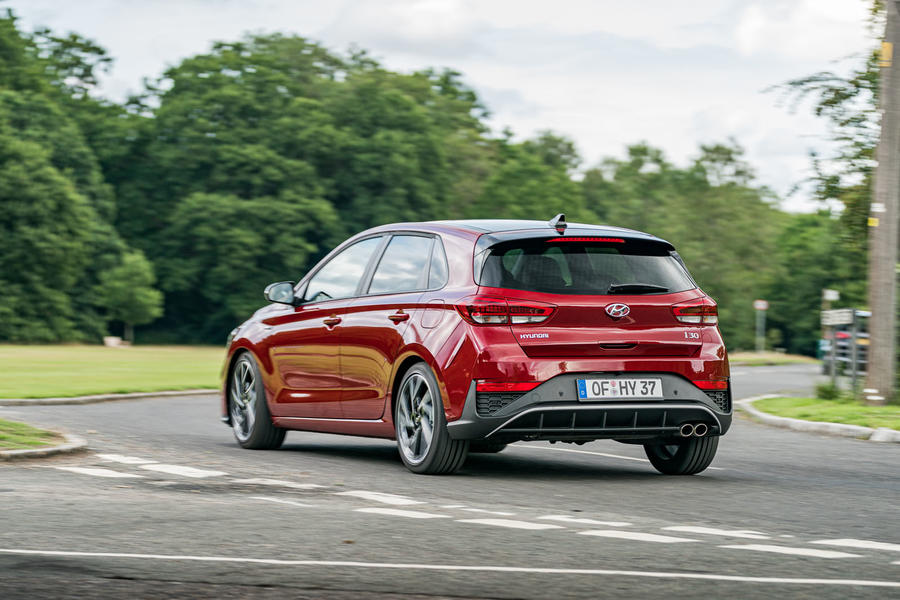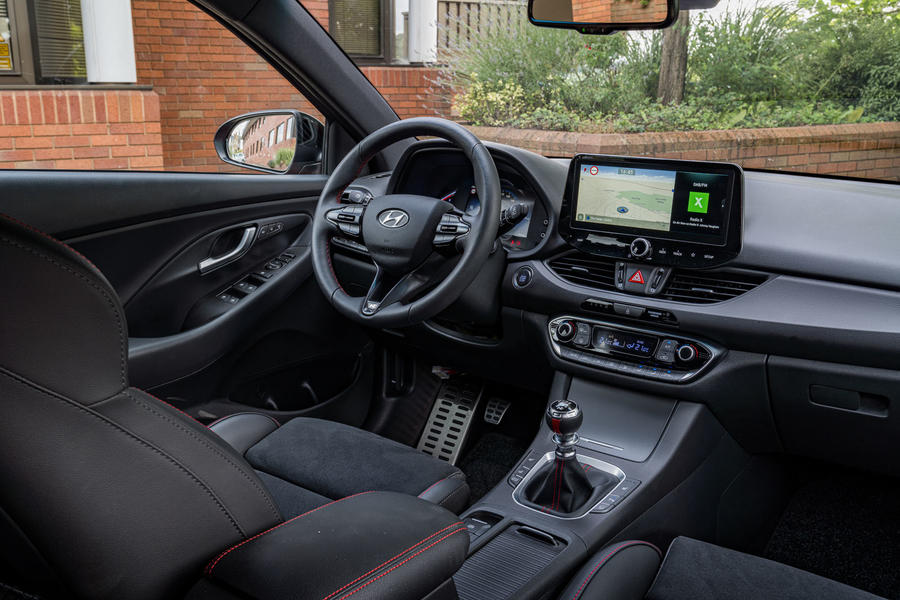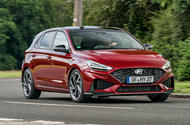Mild-hybrid power arrives for warm family hatchback. We drive a left-hooker in the UK ahead of launch
Hyundai has gone and fitted its sleek looking i30 family hatchback with a new 48V mild-hybrid architecture as part of a mid-life refresh.
The idea of a 48V integrated starter-generator will be a familiar one to many by now, and its application here is unsurprisingly intended to help the i30 achieve very modest savings in fuel consumption and CO2 emissions.
That electrified architecture is based around one of two petrol engines: a 118bhp 1.0-litre turbo three-pot or a new 1.5-litre 158bhp turbo four-cylinder, tested here in left-hand-drive, pre-production guise. In the UK, this range-topping engine will be paired exclusively with Hyundai’s N Line trim level.
Speaking of N Line, this pseudo-sporting trim level has been subjected to a bit of a nip-and-tuck, too. A larger grille, sharper bumpers and a revamped headlight design all feature, all contributing to a noticeably more sporting image than what you got on the original i30 N Line. It’s still not quite as pumped up as the full-fat i30 N, but it’s not a bad-looking thing, either.
The i30’s suspension and steering have both been slightly tweaked too, provided you go for the 1.5-litre petrol engine.
For a range-topping engine, there isn’t really all that much punch on offer here. Press the throttle and after a slight delay the i30 begins to accrue pace, but power delivery never feels that urgent and can come across as slightly boosty at times. At least the engine sounds smooth, but its lack of performance is a telling reminder that the N Line model is more of a shower than a goer.
In any case, the 153bhp 1.0-litre three-pot you get in the Ford Focus ST-Line not only feels considerably punchier but is also a more genuinely characterful engine.

It’s the Ford that’s the sweeter handling of the two, too. The i30 might just edge it when it comes to ride comfort, but the Focus is certainly the more entertaining car to bomb around in. Compared with the Hyundai’s nicely assisted but slightly dead helm, the Focus just feels that much more alive in your hands and that much more willing to respond keenly to your inputs.
That’s not to say the i30 is a reluctant old crate – far from it, in fact. But as a marginally more driver-focused take on a regular family hatchback, its demeanour is just a bit too normal.
However, it does have a sweet manual gear shift. Accurate and tactile, it’s arguably the most noticeable feature that has managed to trickle its way down from the i30 N. So it’s a bit of a shame that the process of using it is slightly marred by a clutch pedal that feels almost ridiculously light, although I can certainly see how it might appeal if you found yourself on the M25 in rush-hour traffic.
The cabin is classic Hyundai fare, in that it feels well made and is sensibly laid out but lacks any real sort of visual pizzazz. Still, I guess the same can be said about the Focus, and there is in fact a decent amount of space on offer in the i30.
Second-row passengers will find they can sit in relative comfort, and the boot is a good size, too.
Hyundai has also updated the i30’s infotainment suite so that there’s now a 7.0in digital instrument cluster behind the wheel and a larger (10.25in) touchscreen on top of the dashboard. As this wasn’t fully operational in our pre-production test car, it’s tricky to say just how good it will be when ready, but its sat-nav mapping looked suitably detailed in any case.

If a refined, comfortable and sporty-looking family hatchback is what you’re after, you could do worse than opt for this new i30 N Line mild-hybrid. Even in pre-production guise, it feels like a nicely polished car, so it seems fair to assume that this side of things might only improve when it’s finally signed off. An updated arsenal of active safety systems will no doubt appeal to family-minded buyers, too.
However, there are absolutely more entertaining and characterful rivals out there, with the Focus ST-Line being the most serious threat to the Hyundai’s success. Some may prefer the Korean car’s slightly more laid back, no-nonsense set-up, but a shortage of punch and a character that just seems a bit disinterested make it a bit trickier to get excited about.
Hyundai hasn’t said anything about pricing just yet, but based on existing figures for the current N Line models, we would guess that prices for the new 158bhp i30 N Line will start at around £23,000. We’ll no doubt find out in a month or so.
Hyundai i30 1.5 T-GDi 48V N Line specifications
Where Buckinghamshire, UK On sale September Price £23,000 (est) Engine 4cyl, 1482cc, turbocharged, petrol, with integrated starter-generator Power 158bhp at 5500rpm Torque 187lb ft at 1500-3500rpm Gearbox six-speed manual Kerb weight 1250kg Top speed 130mph 0-62mph 8.4sec Economy 50mpg (est) CO2 128g/km (est) Rivals Seat Leon FR, Ford Focus ST-Line
READ MORE
Hyundai i30 gets redesign, new tech and mild hybrids for 2020
2021 Hyundai 45: new electric crossover caught on video
Source: Autocar
